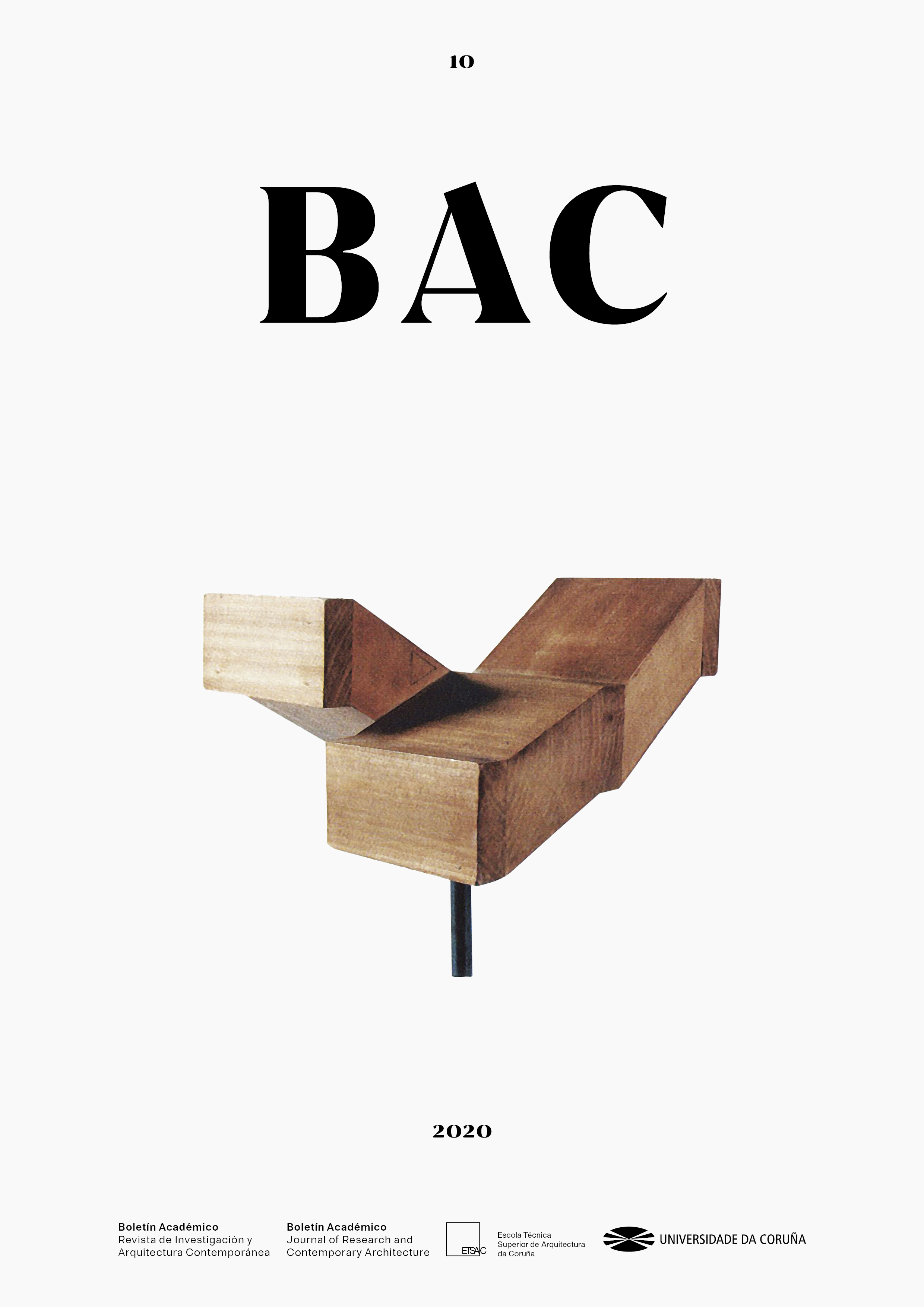Rituales de libertad: disciplina y biopolítica de la arquitectura docente
DOI:
https://doi.org/10.17979/bac.2020.10.0.5747Palabras clave:
arquitectura docente, antropo-técnicas, Colegio Sant’Elia de Giuseppe Terragni, Escuela en Broni de Aldo Rossi, McCormick Tribune Campus Center de OMAResumen
Según Michel Foucault y Peter Sloterdijk la arquitectura es un conjunto de técnicas y dispositivos materiales cuyo objetivo es producir sujetos domesticados según un tipo específico de poder. La arquitectura propia del poder disciplinar pretende producir individuos homogéneos acordes con una norma ideal definida a priori a través de unos rituales espaciales lineales y unívocos. En cambio, la arquitectura propia del poder biopolítico utiliza la interconexión de espacios y la indeterminación programática con el objetivo de hacer funcionar la libertad de las personas como medio de auto-domesticación productiva. Dado que la arquitectura docente es una de las principales categorías arquitectónicas involucradas en la producción de sujetos, analizamos tres proyectos paradigmáticos –el colegio Sant’Elia de Giuseppe Terragni, la escuela en Broni de Aldo Rossi y el McCormick Tribune Campus Center de OMA- que muestran el modo en que la arquitectura ritualiza la conducta de sus usuarios.
Descargas
Referencias
Chipperfield, David, Kieran Long, y Shumi Bose, eds. Common Ground. Venice Biennale of Architecture 2012. Venezia: Marsilio, 2012.
Choay, Francoise. L’Urbanisme: Utopies et realités. Paris: Editions du Seuil, 1965.
De Carlo, Giancarlo. Architecture et liberté. Paris: Editions du Linteau, 2004.
Defert, Daniel. “Heterotopía: tribulaciones de un concepto entre Venecia, Berlín y Los Ángeles.” En El cuerpo utópico: Las heterotopías, de Michel Foucault, 33-60. Buenos Aires: Nueva Visión, 2009.
Eisenman, Peter. Giuseppe Terragni: Transformations, Decompositions, Critiques. New York: The Monacelli Press, 2003.
Fichte, Johann Gottlieb. Discursos a la nación alemana. Madrid: Tecnos, 1988.
Foerster, Heinz von. Understanding Understanding: Essays on Cybernetics and Cognition (New York: Springer, 2002.
Foucault, Michel. Historia de la sexualidad 3: El cuidado de sí. Madrid: Siglo XXI, 2005.
Foucault, Michel. Seguridad, territorio y población: Curso en el Collège de Francia, 1977-1978. Buenos Aires: Fondo de Cultura Económica, 2006.
Foucault, Michel. Vigilar y castigar. Madrid: Siglo XXI, 2005.
Frampton, Kenneth. Historia crítica de la arquitectura moderna. Barcelona: Gustavo Gili, 2009.
Francastel, Pierre. Arte y técnica en los siglos XIX y XX. Madrid: Debate, 1990.
Fullaondo Buigas de Dalmau, Diego. “La invención de ‘La Fonction Oblique’”, Tesis doctoral, Universidad Politécnica de Madrid, 2011.
Goodman, Robert. After the Planners. London: Penguin Books, 1972.
Ishigami, Junya. Freeing Architecture. Paris: Fondation Cartier, 2018.
Jacobs, Jane. The Death and Life of Great American Cities. New York: Random House, 1961.
Jacobs, Jane. La economía de las ciudades. Barcelona: Ediciones Península, 1971.
Kontopoulos, Kyriakos. The Logics of Social Structure. London: Cambridge University Press, 1993.
Koolhaas, Rem. Espacio basura. Barcelona: Gustavo Gili, 2007.
Laval, Christian, y Pierre Dardot. Común: Ensayo sobre la revolución en el siglo XXI. Barcelona: Gedisa, 2015.
Lefebvre, Henri. De lo rural a lo urbano. Barcelona: Península, 1971.
Lefebvre, Henri. Le droit a la ville. Paris: Anthropos, 1968.
Lefebvre, Henri. Más allá del estructuralismo. elaleph.com, 2000.
Lefebvre, Henri. Space, State, World. Minneapolis: University of Minnesota Press, 2009.
Lefebvre, Henri. La vida cotidiana en el mundo moderno. Madrid: Alianza Editorial, 1984.
Moore, Charles. The Place of Houses. New York: Holt, Rinehart & Winston, 1974.
MVRDV. MVRDV at VPRO. New York: Actar, 1999.
Negri, Antonio, y Michael Hardt. Multitude. New York: The Penguin Press, 2004.
Ostrom, Elinor. Understanding Knowledge as a Commons: From Theory to Practice. Massachusetts: The MIT Press, 2007.
Parent, Claude. Vivir en lo oblicuo. Barcelona: Gustavo Gili, 2009.
Pérez Herreras, Javier. “Nuevas especies de espacios,” ARQ, no. 82 (2012): 30-37.
Sennett, Richard. Juntos. Rituales, placeres y política de cooperación. Barcelona: Anagrama, 2012.
Sloterdijk, Peter. Esferas II: Globos. Madrid: Siruela, 2003.
Sloterdijk, Peter. Esferas III: Espumas. Madrid: Siruela, 2006.
Sloterdijk, Peter. Estrés y libertad. Buenos Aires: Godot, 2017.
Sloterdijk, Peter. Normas para un parque humano: Una respuesta a la ‘Carta sobre el humanismo.’ Hamburgo: Die Zeit, 1999.
Tafuri, Manfredo, y Francesco Dal Co, Arquitettura contemporanea. Milano: Electa, 1980.
Tschumi, Bernard. Event-cities. Massachusetts: The MIT Press, 1994.
Virilio, Paul. Speed and Politics. Los Angeles: Semiotext(e), 2006.
Virilio, Paul. Virilio live: Selected Interviews. edited by John Armitage. London: SAGE, 2001.
Virno, Paolo. A Grammar of the Multitude. Los Angeles: Semiotext(e), 2004.
Virno, Paolo, y Michael Hardt, eds. Radical Thought in Italy: A Potential Politics. Minnesota: University of Minnesota Press, 2006.

